Ashwagandha to Boost Energy
One of the top reasons that people first try ashwagandha is to boost energy. A lack of energy is something that people with chronic health issues have in common.
Fatigue is the number one reason most people visit their doctor nowadays.
Ashwagandha is a well known energy-boosting medicinal plant. It also lowers the stress hormone known as cortisol. Ashwagandha can even improve sleep by providing tryptophan to the body. Tryptophan is a precursor to the “sleep hormone” known as melatonin.
It’s no wonder that ashwagandha is used to increase energy. If we we are less stressed then our energy will be higher. If we sleep better then, again, our energy will be higher. If you struggle with fatigue then you might want to consider consuming ashwagandha like people have been doing for centuries.
As you’ll soon learn, ashwagandha has many other health benefits in addition to boosting energy. Keep reading to see if it’s right for you!
Ancestral Use of Ashwagandha
Ashwagandha has been used for centuries, particularly in Ayurvedic medicine in India. Ayurvedic medicine which is referred to as “the knowledge of life” dates back to at least 3,000 B.C. Ashwagandha is a medicinal plant used in Ayurveda. It is an evergreen shrub that’s part of the nightshade family. It grows well in India, North Africa, and the Middle East.
Ashwagandha has been dubbed as Indian ginseng due to its adaptogenic properties that have some similarities to Panax ginseng, however, it’s a much different plant. Its scientific name is Withania somnifera. It is an extremely potent adaptogen that “adapts” to what your body needs. It rejuvenates the organs, hormones, and cells in your body.
As people in India say, you can gain the “strength of the stallion” when you regularly consume ashwagandha. It is well known for strengthening the immune system. Ashwagandha is also considered in Ayurveda to be a raysana which basically means that it lengthens lifespan, and boosts vitality as well as happiness.
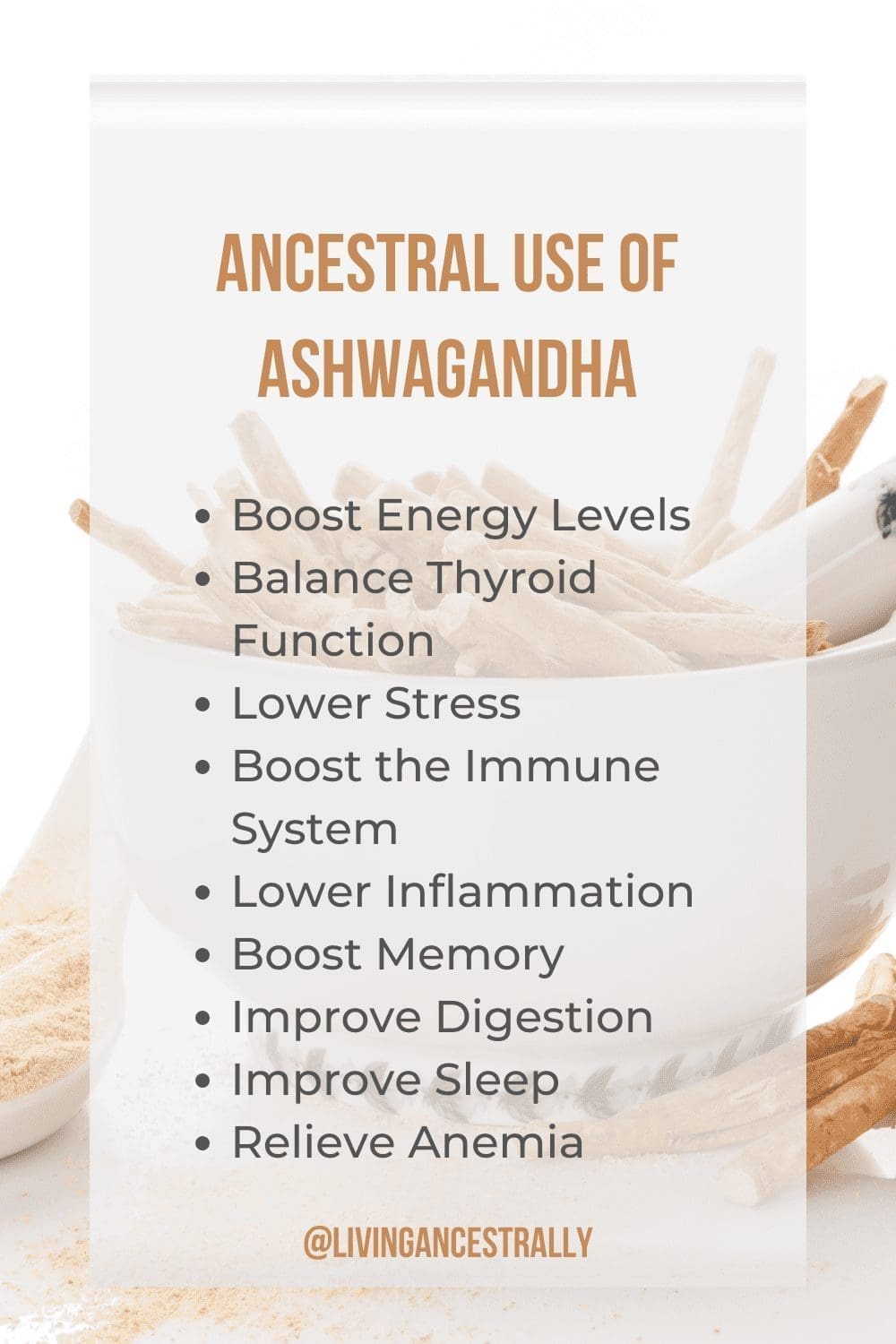
What is an Adaptogen?
Ashwagandha is one of many adaptogens. Panax ginseng, Rhodiola, astralagus, turmeric, and eleuthero root are other examples of adaptogens. Adaptogens basically help your body adapt to stress.
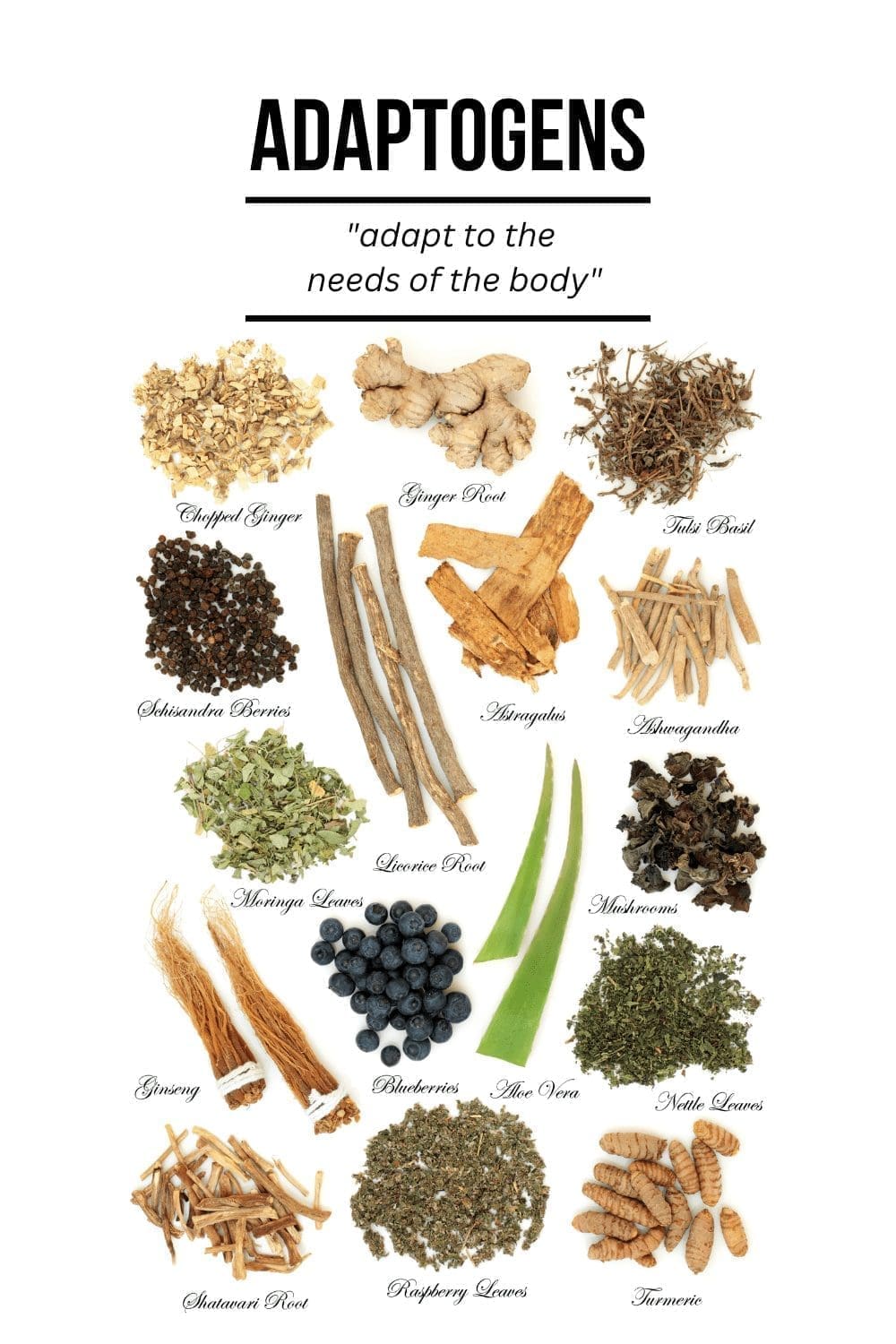
Adaptogens also “adapt” to the needs of your body. For instance, if you lack energy then as an adaptogen, ashwagandha can boost your energy levels, whereas it can help you sleep if you have insomnia or lack deep sleep. In a way, it’s as if adaptogens fill in where needed.
Consulting with a master herbalist is recommended for anyone who has a serious health condition. They can help find the right adaptogen for your needs.
6 Benefits of Ashwagandha
Ashwagandha has been safely used for centuries for its many medicinal benefits. As already mentioned, ashwagandha also has some extensive scientific research to back up its use. Here are a few of the many uses of ashwagandha.
Boosts Energy and Stamina
Ashwagandha is well-known for its energy-boosting properties. It has a calming yet energetic effect on the brain thanks to the neurotransmitters that it contains.
It has also been shown in studies to lower the main stress hormone known as cortisol. As a result, people experience increased energy levels, as well as a boost motivation and concentration.
One study showed that ashwagandha increased speed and strength. While another study showed a boost in muscular strength in the males that participated. In this study, the male participants experienced significant increases in muscle size and strength, as well as a reduction in their body fat percentage.
Modulates the Immune System
As an adaptogen, ashwagandha adapts to what you need to optimally support your immune system. If your immune system needs a boost, like during the colder months when you’re indoors more, then ashwagandha can strengthen your immune cells.
Ashwagandha strengthens your immune system by increasing the production of immunoglobulins in your body. It has also been shown to lower inflammation by suppressing pro-inflammatory cytokines.
Combats Stress, Anxiety, and Depression
As already mentioned, ashwagandha lowers stress by lowering stress hormones within the body. It also is often used to decrease anxiety.
In one study, ashwagandha performed better at lowering anxiety (and with no side effects) than common anti-anxiety pharmaceutical drugs. In the study, participants taking ashwagandha had a 55 percent decrease in anxiety scores, while those taking lorazepam and imipramine had a 30.5 percent reduction in their anxiety scores.
Ashwagandha also has the ability to improve depression in those with clinical depression.
A rat study compared the anti-depressant drug known as imipramine to ashwagandha. Ashwagandha outperformed the drug and it was concluded to be more effective at lowering depression.
Modulates Adrenal and Thyroid Function
Ashwagandha may help to support adrenal function. Your adrenal glands release hormones like cortisol and adrenaline in response to stress. Too much cortisol and adrenaline released over a long period of time can lead to adrenal fatigue. Basically, your adrenals become exhausted. Ashwagandha has been shown to help improve adrenal function, whether your adrenal glands are overworked or not.
Individuals with underactive thyroid conditions like Hashimoto’s and hypothyroidism may also benefit from using ashwagandha.
In a 2017 study, participants with sub-clinical hypothyroidism had improvements after 8 weeks of taking an ashwagandha extract in:
✔️ Serum thyroid stimulating hormone (TSH)
✔️ Thyroxine (T4) levels
It should be noted that ashwagandha might not be appropriate for those with hyperactive thyroid conditions like Graves’ Disease.
Increases Blood Volume
For those with anemia, ashwagandha may be worth considering. Research has shown that it can:
• Increase red blood cell count
• Increase hemoglobin count
• Increase maximum oxygen consumption (VO2 max). Having a healthy VO2 max is very important. Your VO2 max reveals how well your heart and veins push blood to your muscles, as well as to the rest of your body.
Improves Memory and Protects Against Brain Cell Loss
Ashwagandha is extremely high in antioxidants. The antioxidants help to combat free radicals in the body. Free radicals lead to damage in the human body. The antioxidants in ashwagandha may help to protect the brain from damage caused by free radicals.
In a 2017 study that was published in the Journal of Dietary Supplements, researchers found that ashwagandha helped boost memory in the study participants. It was also found to boost mental skills, information processing speed, and attention.

How Much Ashwagandha Should I Take?
There is no official recommended amount of ashwagandha to take per day. However, with most adaptogens, it is advisable to take 4 weeks off every 2-3 months. You will experience greater results if you cycle your intake of adaptogens.
Here are a few general recommendations:
✔️ Many herbalists advise their patients start with 300-500 mg per day of ashwagandha. Observe how your body responds to that amount for several days.
✔️ If all is well, you may want to slowly work your way up to taking 1,000-1,500 mg per day.
✔️ Some experts even recommend taking up to 6,000 mg a day, however, it may be wise to stick to a more moderate level unless you are working closely with a practitioner who is monitoring you.
It can take 1-2 weeks to see any improvement from ashwagandha supplementation and no significant improvements will probably be seen at the lower intake levels. You’ll see more of an improvement towards the end of 2 weeks as you have increased the amount you are taking. It takes a while for ashwagandha to build up in your body.
In Ayurveda, ashwagandha root is traditionally consumed in powdered form rather than an extract. It is best to seek out an ashwagandha powder that contains 1-10% withanolides. These special natural compounds are plant steroids. They are responsible for providing the primary therapeutic effects of ashwagandha, so it’s helpful to choose a product that contains that percentage of withanolides.
Who Should Avoid Ashwagandha?
Ashwagandha is generally a very well-tolerated medicinal plant with most people never experiencing negative reactions, however, some people may want to avoid it.
A few general negative reactions that some people may experience include constipation, loose stools, and vomiting. Those negative reactions are typically from people taking too much ashwagandha too quickly. Of course, stop taking ashwagandha if you experience any of those issues from it.
Please avoid ashwagandha if you fall under any of the below categories.
❌ If you are pregnant or breastfeeding. There is some evidence that it may cause miscarriages. There is no safety evidence for taking ashwagandha while breastfeeding.
❌ You have a hyperactive thyroid condition.
❌ Ashwagandha is a part of the nightshade family, so if you are allergic or sensitive to those plants, then it’s best to avoid it.
❌ Stop taking ashwagandha two weeks before any planned surgery in case ashwagandha slows down your central nervous system.
As always, if you are taking any medication or have any serious health condition, then it is always advisable to consult your health provider to ensure that you won’t experience any negative effects from taking something new.
What Health Conditions Is Ashwagandha Used For?
✔️ Anemia
✔️ Insomnia
✔️ Infertility
✔️ Chronic Stress
✔️ Adrenal Fatigue
✔️ Chronic Fatigue
✔️ Osteoarthritis
✔️ Rheumatoid Arthritis
✔️ Underactive Thyroid
✔️ Hormonal Imbalances
✔️ Histamine Intolerances
✔️ Anxiety
✔️ Depression
✔️ Mast Cell Activation Syndrome
Of course, always consult your healthcare provider before adding anything new to your health routine. Ashwagandha is often used for the above health conditions, but it may not be ideal for your situation.
Ancestral Recipes
Traditional cultures have incorporated ashwagandha into their daily wellness routine for centuries.
It is a very bitter plant, so many modern-day people like to add ashwagandha powder to drinks like milk and smoothies, and sweets. In this article, we’ve included two ancestrally-based recipes that incorporate ashwagandha as well as a more modern-day recipe.
Ashwagandha Churna
Ashwagandha churna is a traditional way to consume ashwagandha. As previously mentioned, ashwagandha is earthy and extremely bitter tasting. It’s helpful to find ways to disguise the taste if you are really seeking out the amazing health benefits of ashwagandha at higher doses. Consuming a fat source (like ghee, coconut oil, butter, or milk) with ashwagandha is beneficial in order to increase absorption.
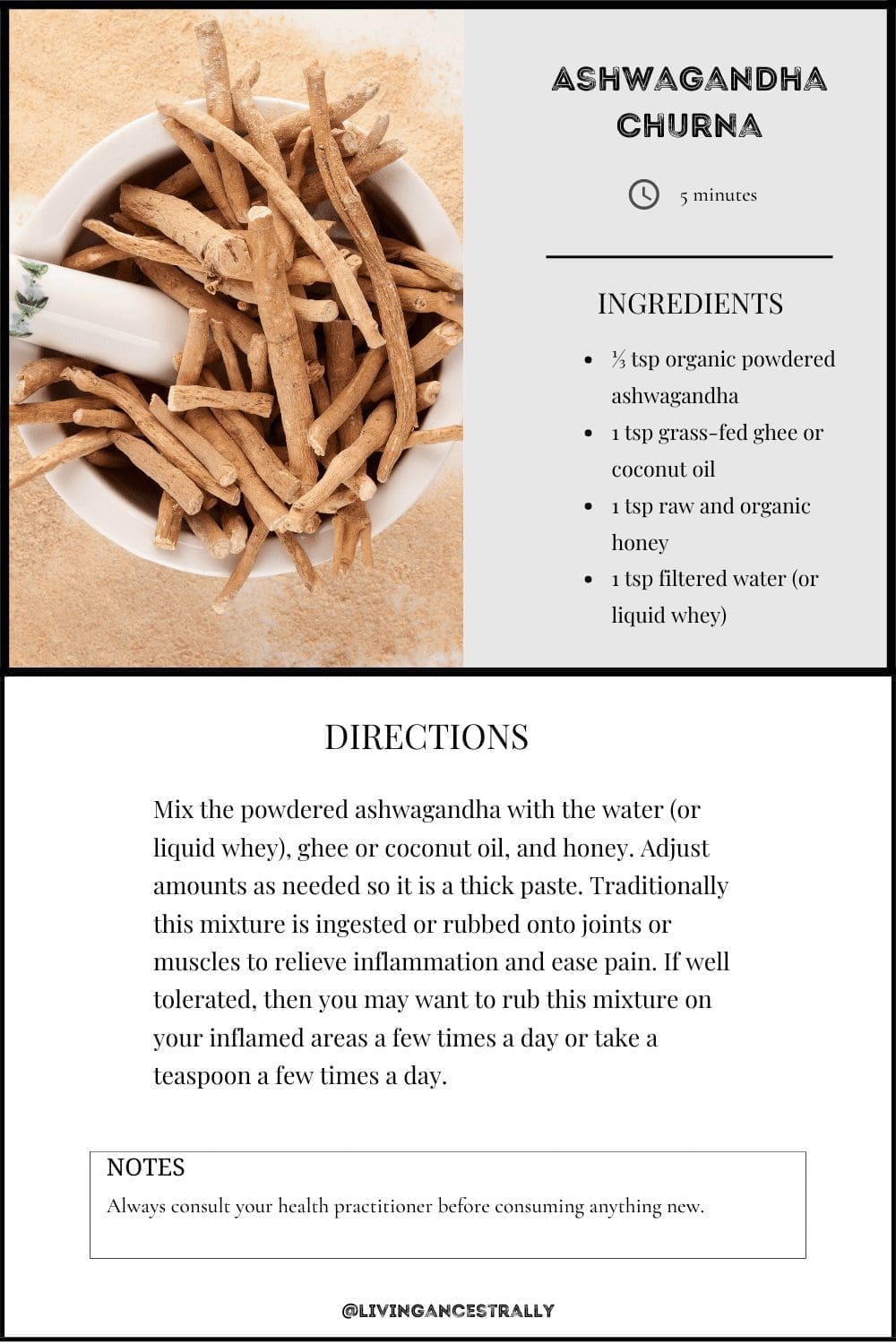
Ashwagandha Golden Moon Milk
One of the most common ways to consume ashwagandha is by adding it to warm milk. Raw milk would be ideal since it still contains all of the beneficial enzymes. If raw milk is not available to you then a low-VAT pasteurized whole milk is a decent option. Brands like Kalona and Alexandre offer low-VAT pasteurized milk and they can be found at many health food grocery stores. Low-VAT milk is not heated as high as ultra-pasteurized milk, so in theory, the valuable natural enzymes would not be destroyed. Full-fat coconut milk can be used if you prefer to avoid dairy.
This “Moon Milk” recipe is a common warming drink in India that is consumed at night before bed. Try it out and see what you think! It boosts the immune system as well as promotes deep sleep. The tryptophan in ashwagandha is likely one of the reasons that it helps with sleep. Tryptophan is a precursor to melatonin (“the sleep hormone”).
Of course, check the ingredients to make sure you don’t react negatively to any of them, or else you won’t sleep well.
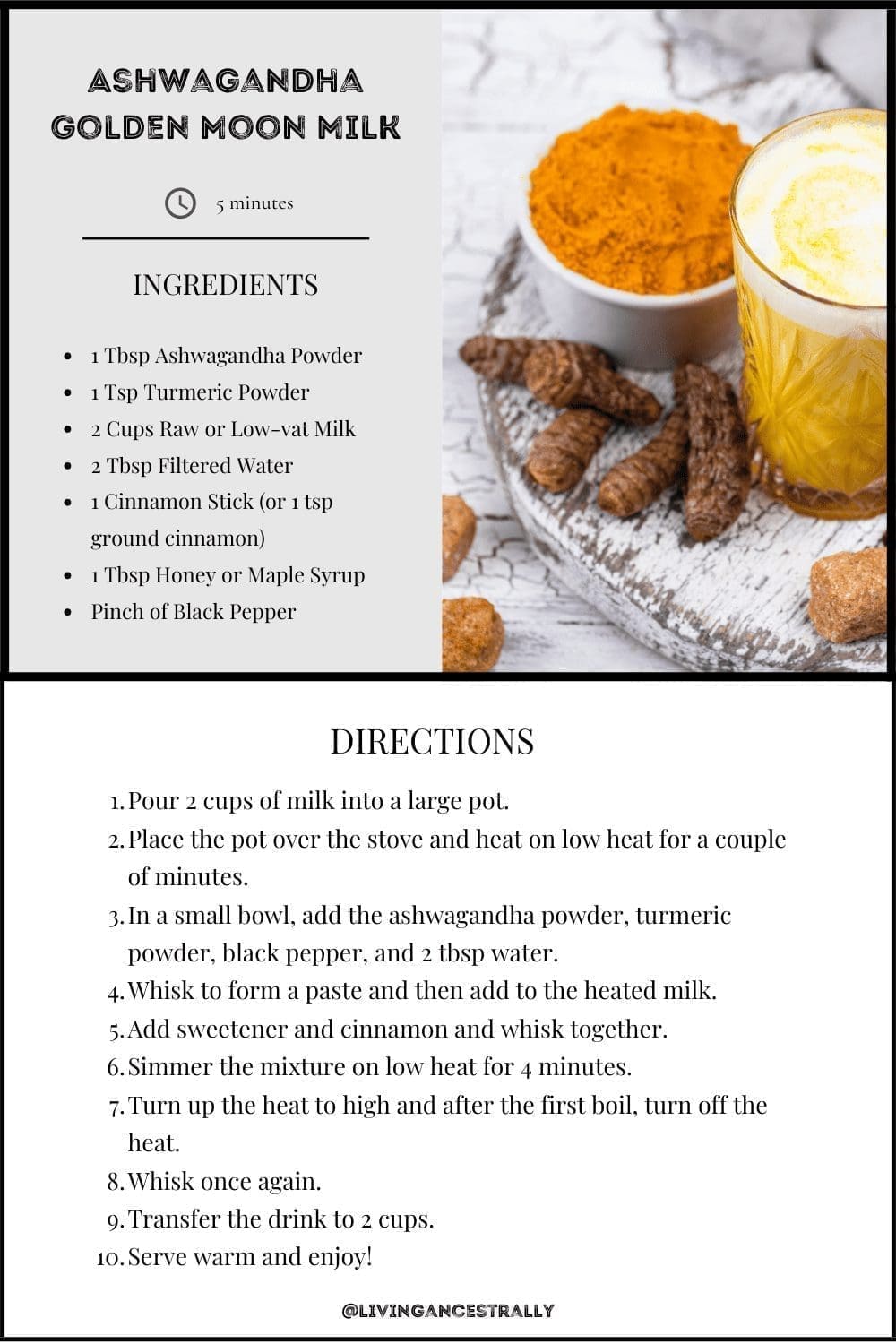
Modern Ashwagandha Recipe
This modern ashwagandha recipe is an excellent way to boost your energy. It’s pretty tasty also! The other ingredients in this recipe disguise the earthy ashwagandha flavor. Try it and let me know what you think!
Ashwagandha and Bee Pollen Truffles
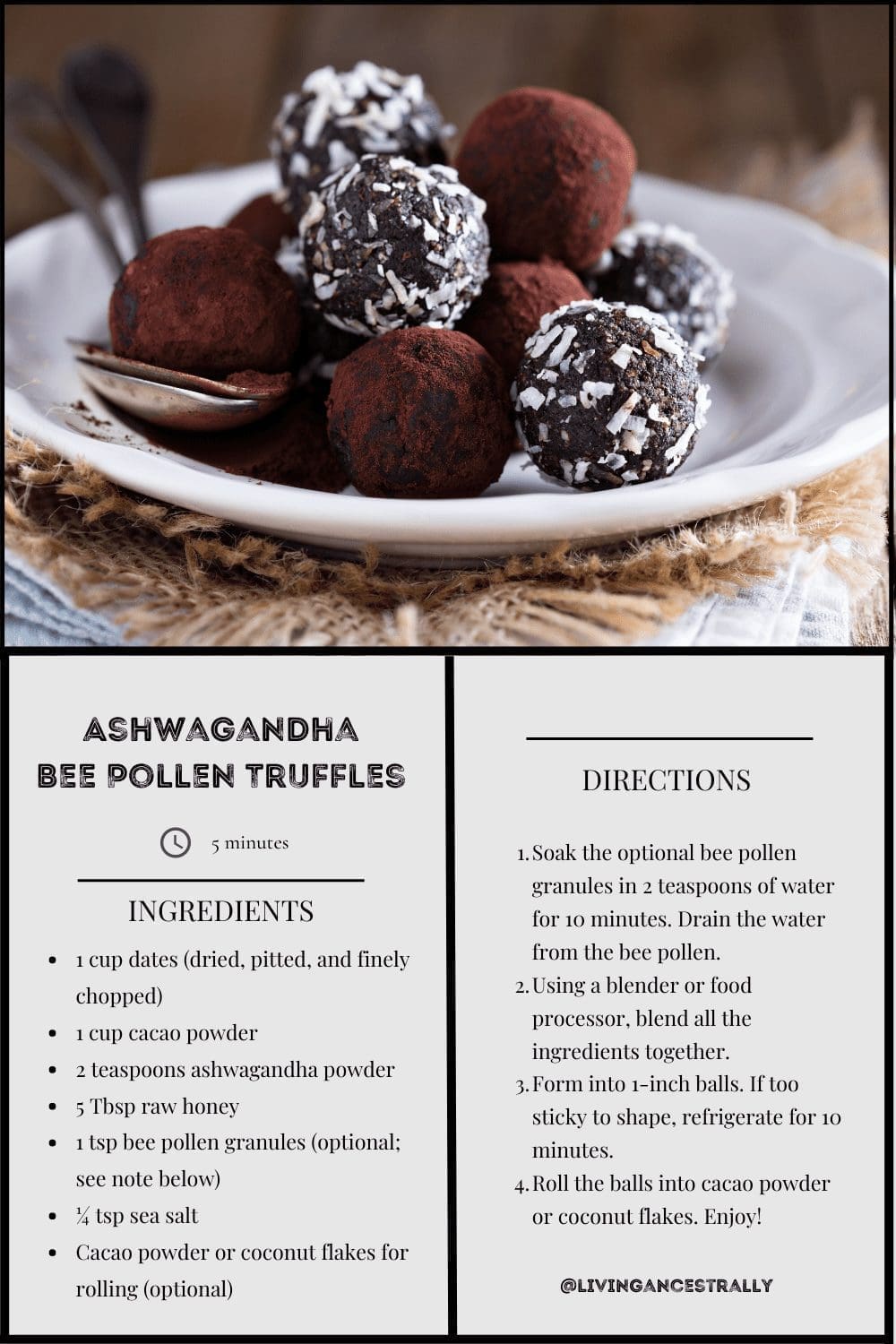
“Should I Take Ashwagandha?”
As always, it depends. Ashwagandha is a long-used medicinal plant that has a laundry list of benefits. Since it is considered to be relatively safe, it may be worth pursuing for your situation, particularly if naturally increasing energy is a goal for you.
Ashwagandha’s ability to lower stress, improve depression, boost energy levels, help relieve insomnia, improve anemia, lower histamine levels, boost memory and cognitive performance, ease inflamed joints and muscles, balance adrenal function, and much more make it a potential aide for many health challenges.
If our diet and lifestyle are less than ideal then no amount of ashwagandha can heal health issues. It should be a secondary focus. With my nutrition consulting clients, I ensure that they are getting all of the essential nutrients from extremely bioavailable whole foods before I dive into additional natural medicinal support like ashwagandha.
In addition to adopting a healthy traditional food diet, an incredible nutrient to FIRST place emphasis on is magnesium. Trying out our magnesium water recipe and magnesium lotion recipe are a good place to start for most people since the forms of magnesium in those recipes are easily tolerated and extremely well-absorbed by the body. Plus they are budget-friendly!
A healthy traditional food diet should always be the primary focus when seeking balance in your body. A huge emphasis should be placed on eating bioavailable and highly nutritious whole foods. Preparing foods using the methods that traditional cultures used is ideal since the focus is on consuming highly absorbable foods in which the plant anti-nutrients are reduced.
This article is for informational purposes only and not intended to diagnose, treat, or cure any condition. Always consult your healthcare provider before starting anything new. Note that Hair Tissue Mineral Analysis (HTMA) is not a diagnostic tool and does not replace medical tests prescribed by your doctor.
